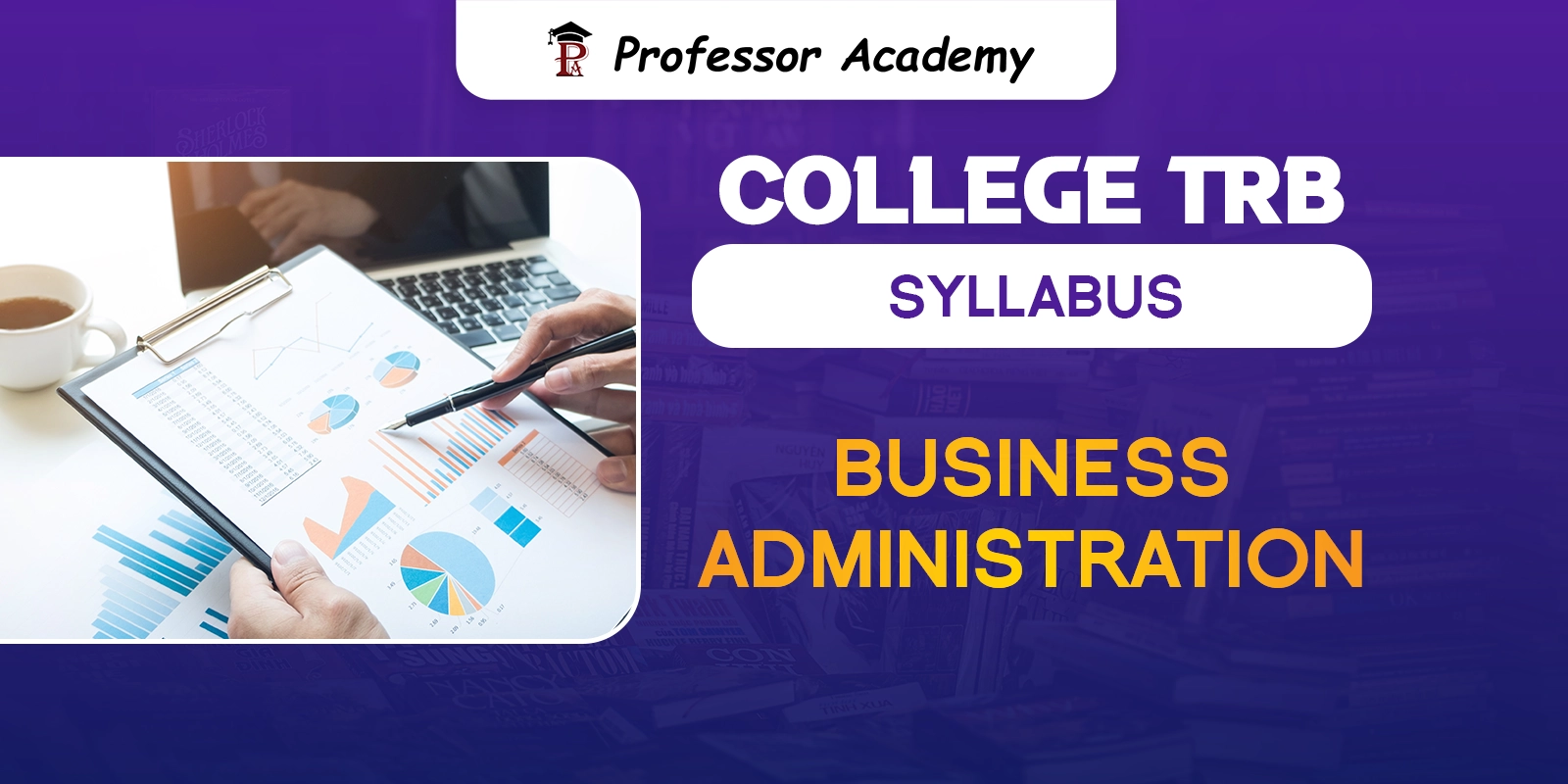TN TRB Assistant Professor Syllabus -BUSINESS ADMINISTRATION

Introduction
The TN TRB Assistant Professor Business Administration Syllabus provides a detailed structure for candidates preparing for the Tamil Nadu Teachers Recruitment Board (TRB) examination in Business Administration. It covers a wide range of management-related topics, including organizational behavior, human resource management, marketing, financial management, business law, and strategic management. The syllabus also includes emerging areas such as entrepreneurship, business ethics, and digital management practices. This framework helps candidates build a solid foundation in business concepts and leadership skills essential for academic and administrative excellence.
TN TRB Assistant Professor Syllabus – BUSINESS ADMINISTRATION
UNIT – 1 :
Evolution of management thought: Systems and contingency approach for understanding organizations; Managerial processes, functions, skills and roles in an organization; Social Responsibility of Business; Understanding and Managing individual behaviour; Personality; Perceptions; Attitudes; Learning; Decision-making; Management by Objectives; Understanding and managing group processes–interpersonal and group dynamics; Applications of Emotional Intelligence in organizations. Leadership and influence process; Work Motivation. Understanding arid Managing organizational system—Organizational design and structure, Work stress, Organizational Change and development; Conflict Management; Stress Management.
UNIT – 2 :
Nature, components and determinants of business environment, dynamics of business environment, key indicators; Risk in business environment, Assessing business environment–country risk and political risk. Current state of business environment in India–Economic reforms–Liberalization, privatization, globalization, industrial policy and industrialization trends, public enterprise reforms and disinvestment programme; competitive environment; financial environment. India’s current balance of payment position, globalization trends, Trade reforms & trends, FIJI poky & trends, India’s share in world economy. Trends in global trade & investment; Nature & operations of multilateral economic institutions–World Bank, WTO, IMF and their impact on the Indian business environment. Factors of global competitiveness. Strategic management process and Evaluation.
UNIT – 3 :
Accounting Principles and Standards, Preparation of Financial Statements; Financial Statement Analysis – Ratio Analysis, Funds Flow and Cash Flow Analysis, DuPont Analysis; Preparation of Cost Sheet, Marginal Costing, Cost Volume Profit Analysis Standard Costing & Variance Analysis; Financial Management, Concept & Functions; Capital Structure – Theories, Cost of Capital, Sources and Finance Budgeting and Budgetary Control, Types and Process, Zero base Budgeting; Leverages – Operating, Financial and Combined Leverages, EBIT–EPS Analysis, Financial Break even Point & Indifference Level.
UNIT – 4 :
Value & Returns – Time Preference for Money, Valuation of Bonds and Shares, Risk and Returns; Capital Budgeting – Nature of Investment, Evaluation, Comparison of Methods; Risk and Uncertainty Analysis.
Dividend – Theories and Determination; Mergers and Acquisition – Corporate Restructuring, Value Creation, Merger Negotiations, Leveraged Buyouts, Takeover; Portfolio Management – CAPM, APT.
Derivatives – Options, Option Payoffs, Option Pricing, Forward Contracts & Future Contracts; Working Capital Management – Determinants, Cash, Inventory, Receivables and Payables Management, Factoring; International Financial Management, Foreign exchange market.
UNIT – 5 :
Nature, scope and concept of marketing, Corporate orientations towards the marketplace; The Marketing environment and Environment scanning; Marketing information system and Marketing research; Understanding consumer and Industrial markets; Market segmentation, Targeting and positioning; Product decisions — product mix, product life cycle, new product development, branding and packaging decisions; Pricing methods and strategies; Promotion decisions — promotion mix, advertising, sales promotion, publicity and personal selling; Channel management–Evaluation and control of marketing efforts; Ethics in Marketing; New issues in marketing–Globalization, Consumerism, Green Marketing, Direct Marketing, Network Marketing, Event Marketing.
UNIT – 6 :
Concepts and Perspectives on Human Resource Management; Human Resources Management in a changing environment; Corporate objectives and Human Resource Planning; Career and succession planning; job analysis; Methods of manpower search; Attracting, Selecting and retaining human resources; Induction and socialization; Manpower training and development; Performance appraisal and potential evaluation; Job evaluation and compensation;
Employee welfare; Industrial relations & trade unions; Dispute resolution & grievance management, Employee empowerment.
UNIT – 7 :
Nature and Scope of Production and Operations Management; Facility Location; Types of Manufacturing Systems and Layouts; Layout Planning and Analysis; Material Handling : Principles & Equipments; Line Balancing; Production Planning and Control in Mass Production, in Batch and Job Order manufacturing; Capacity Planning; Product Planning and Selection, Process Planning, Aggregate Planning and Master Production Scheduling; Maintenance Management, Work Study : Method Study and Work Measurement, Material Management; An Overview of Material Management, Material Requirement Planning and Inventory Control; JIT; Purchase Management; Stores Management; Quality Assurance : Acceptance Sampling, Statistical Quality Control, Total Quality Management.
UNIT – 8 :
Computers: An introduction; Computes in business; Elements of computer system set-up; Indian computing environment; components of a computer system; Software Packages–An Introduction–Disk Operating System and Windows; Introduction to Word Processor. Introduction to a spreadsheet software; Creation of spreadsheet applications; Range, Formulas, Functions, Data Base Functions in spreadsheet; Graphics on Spreadsheet;
Data Files- Types/Organization; Master & Transaction File; Relevance of Data Base Management; Systems and Integration of Applications; Basics of Data Processing; Data Hierarchy & Data File Structures. Network Fundamentals, Analog and Digital Signals, Band width, Network Topology, Network Applications.
UNIT – 9 :
Significance of Entrepreneur in Economic Development; Economic, Social and psychological need for entrepreneurship; Characteristics, qualities and pre – requisites of entrepreneur; The function of the entrepreneur in economic development of a Country; Methods and procedures to start and expand one’s own business; Life cycle of new business and relationship with large enterprises; Achievement motivation; Environmental Factors affecting success of a new business; Reasons for the failure and visible problems for business-Feasibility Study – Preparation of Feasibility Reports : Selection of factory location, Demand Analysis, Market potential measurement, Capital saving and project costing, Working capital requirements, profit and tax planning; Economic, Technical, Financial and Managerial Feasibility of Project. Government support to new enterprise; Incentives; source of Finance; Role of Government and Promotional agencies in entrepreneurship development.
UNIT – 10 :
Nature and Scope of Research Methodology, Problem, Formulation and Statement of Research Objectives; Value and Cost of Information; Bayesian Decision Theory; Research Process; Research Designs–Exploratory, Descriptive and Experimental; Methods of Data Collection — Observational and Survey Methods; Questionnaire and Interviews. Attitude Measurement Techniques; Administration of Surveys; Sample Design; Selecting an Appropriate Statistical Technique. Field Work and Tabulation of Data; Analysis of Data.
Download TN TRB Assistant Professor Syllabus – BUSINESS ADMINISTRATION: https://professoracademy.com/wp-content/uploads/2025/10/BUSINESS-ADMINISTRATION-SYLLABUS.pdf
Join our College TRB Tamil Eligibility & Descriptive Paper Coaching: https://professoracademy.com/courses/tn-trb-assistant-professor-tamil-eligibility-paper-2-only/
Join Our College TRB Coaching: https://professoracademy.com/product-category/college-trb
Conclusion
The Business Administration syllabus for the TN TRB Assistant Professor exam serves as a comprehensive guide for aspirants aiming to become educators in management studies. It blends theoretical understanding with practical insights, ensuring that candidates are well-equipped to teach and inspire future business professionals. By preparing according to this syllabus, aspirants can confidently face the TRB examination and contribute effectively to the field of business education and research.
For more information
Contact Us : +91 7070701005 / +91 7070701009 / +91 8124408794 / +91 7550100920


